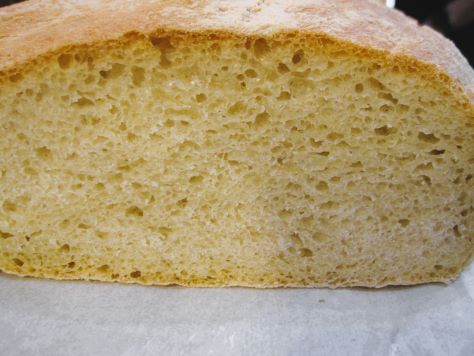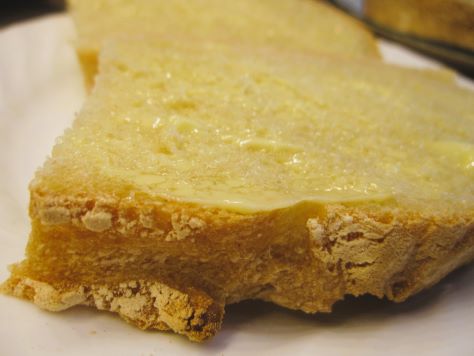The blog is called Bready or Not, and today we are definitely bready with this gorgeous, old-fashioned Country Loaf.
This is a basic boule in the French style. Water, salt, sugar, flour, yeast. Baking is done with added steam–boiling water in a pan below the bread, sending up a cloud to give this loaf the perfect crust.
This bread is absolute perfection toasted with butter, but it’s also great for sandwiches or to go along with soup. Some breads are best hot, but this one is more versatile.
I modified this recipe from a fantastic cookbook called Making Artisan Breads in the Bread Machine by Michelle Anderson. Click here to get it through my affiliate link.
Bready or Not: Country Loaf
Equipment
- bread machine
- large bowl
- parchment paper
- baking sheet or pizza stone
- cake pan
- kettle for boiling water
Ingredients
- 1 3/4 cups lukewarm water 100-110-degrees
- 2 teaspoons sea salt
- 1 teaspoon white sugar
- 4 1/4 cups bread flour
- 1 1/4 teaspoons active dry yeast or bread machine yeast
Instructions
- Add ingredients to bread machine bucket, which usually means liquids first–so water, sea salt, sugar, bread flour, and yeast. Let the dough cycle run.
- Transfer the dough to a large greased bowl, tucking dough under the sides to form a tight ball. Cover with a towel or plastic wrap to let rise for an 1 1/2 to 2 hours.
- Lay out a large piece of parchment paper. Flour lightly. Roll dough onto it, deflating the round and tucking the dough to form a new, smooth round. Flour lightly on top. Cover with towel or plastic wrap again to let rise, 1 to 1 1/2 hours.
- Preheat oven at 500-degrees. Place baking pan or stone on middle rack. On rack below that, place a cake pan with 1 or 2-inch sides. In an electric or stovetop kettle, boil about 2 cups of water.
- Use a sharp knife to score a hash mark across the top of the risen dough. Place the hot baking sheet or stone on the stovetop. Very carefully, use the parchment paper as a sling to move the bread onto the hot pan. Place it in the oven. Immediately use the kettle to carefully pour water into the cake pan on the lower rack; no need to measure the water, but get the pan about half full. Close the oven and do not open it again until the end of baking.
- Bake for 5 minutes. Lower the temperature to 400-degrees. Bake an additional 30 minutes. The bread should be risen and golden. Cool for at least 30 minutes before slicing in.
- This bread is fantastic at room temperature or heated up again. Use it with butter, for sandwiches, whatever you want! While the bread is still fresh, freeze leftovers for later enjoyment, too.








